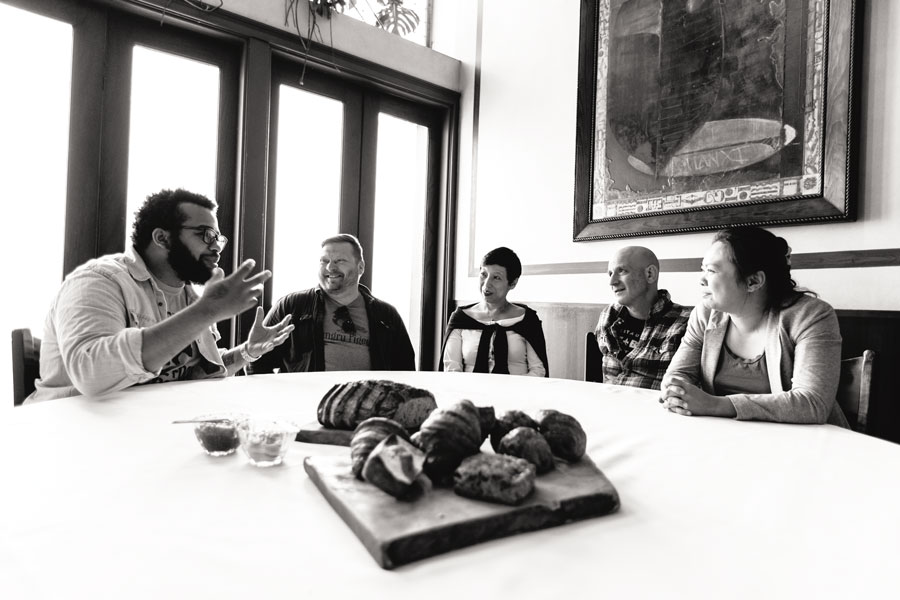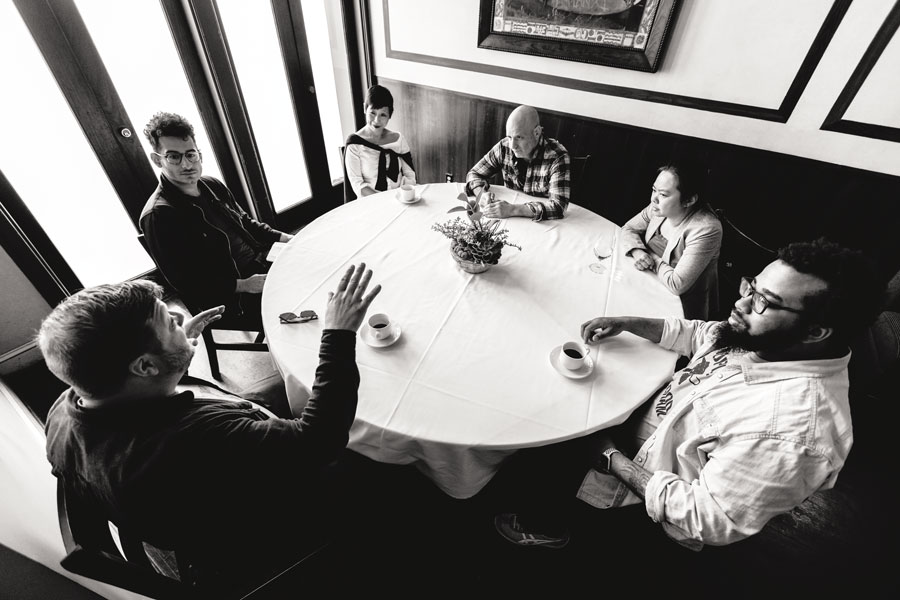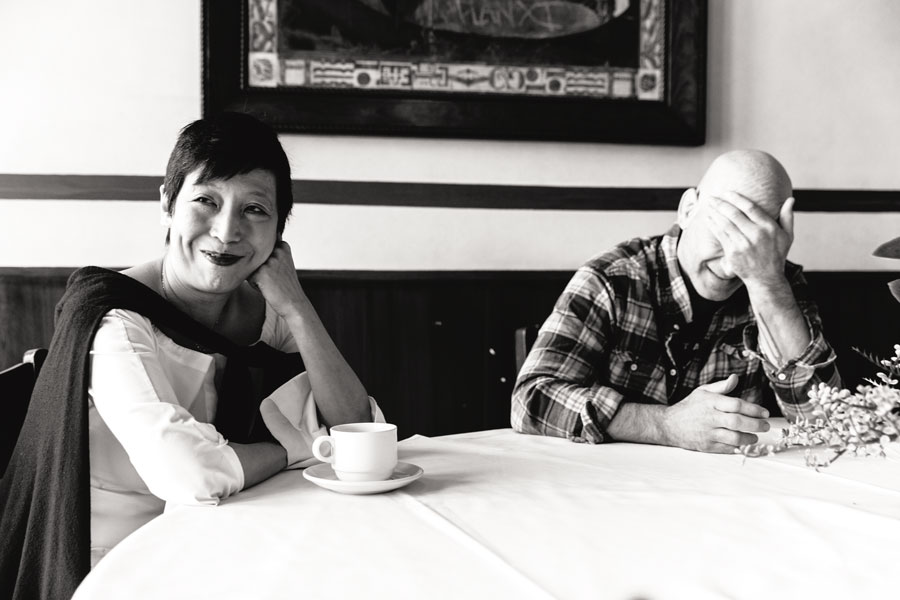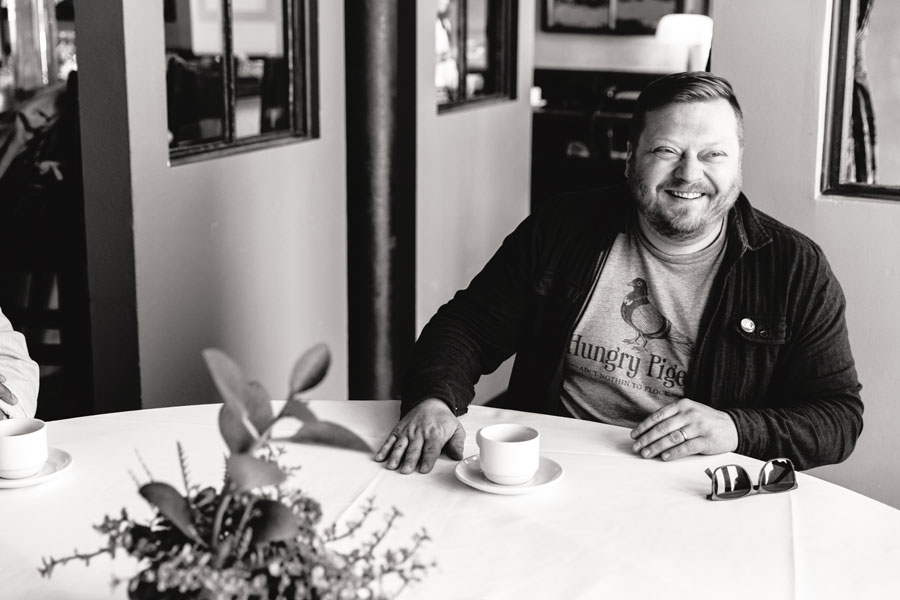Philly Chefs Dish on the Future of Our Food Scene
Nobody knows Philly's food scene better than our chefs and restauranteurs. That's why we got a bunch of them together to tell all.

From left, Philadelphia chefs and restauranteurs Kurt Evans, Scott Schroeder, Ellen Yin, Marc Vetri, and Ange Branca at Fork. Photography by Colin Lenton.
Rents are rising. Instagram is king. Restaurants are opening at a fast clip. Is this the beginning of the end? Are we just getting started? Food editor Alex Tewfik sat down with five industry pros to hash out the state of Philly’s food scene.
THE PANELISTS: Ange Branca, chef-owner, Saté Kampar; Kurt Evans, chef, South Kitchen & Jazz Bar; owner, soon-to-open pizza shop Down North; Scott Schroeder, chef and co-owner, Hungry Pigeon; Ellen Yin, owner, Fork, High Street on Market, and A.Kitchen + Bar; Marc Vetri, chef-owner, Vetri Cucina
Philadelphia magazine: It’s a pretty crazy time to be a restaurant owner or chef in Philly. The landscape keeps expanding, restaurants keep opening, but diners seem to always want more. Are there enough people to support all these restaurants?
Yin: Well, it depends. There’s a ton of development in the city. I think if the development continues, there could be enough people to support what’s going on.
Vetri: People are filling up the rentals. I always hear, “Why are they building another building?” And my answer is, “Because the other one is full.” Young folks are moving here in hordes.
Schroeder: They are moving here from New York, where Philly looks so cheap. I mean, look at Fishtown — what’s the difference between Fishtown and Williamsburg now? You go up there, and that happened so fast.
Vetri: Fishtown happened lightning-fast.
Schroeder: It’s insane, but to me, there are economic bubbles that will burst and pop, because they always do, and we endure them. There are hard times, and there are better times. I think right now, we’re in a great time. We had a pretty great summer, which is something we were concerned with. Philly has a lot of room to grow. It’s not really oversaturated yet. It’s finding line cooks. Where are they?
Yin: The problem is finding the people to work in all of these restaurants.
Schroeder: That’s the worst part. I wake up at night and think to myself: Oh shit, are they going to show up tomorrow?
Branca: I’m going into my third year. Hiring-wise, this has been the hardest year since I opened, and I can’t understand why. The labor force just disappeared. It wasn’t quite available for me the whole summer. This was the first time I had ever experienced a massive turnover in staff. I had so many people come work at the restaurant, do an awesome job for two weeks, and the minute I paid them their first paycheck …
Yin: They never came back.
Branca: I never experienced that before.
Schroeder: I’ve had people, a lot in their 20s, send me the nicest email: “I saw your restaurant, I really want to work there, I love what you’re doing,” etc. So we’ll have a nice interview, and then I’ll schedule a trial, and they don’t show up. Like, what did we do this whole thing for? And sure, they took a job somewhere else, but they didn’t reach out or say … anything to me? I was always polite when I was a kid, because I figured that if you didn’t hire me this time, you might hire me in two years.
Vetri: Then you turn into that guy, and you’re like, “Hey, I’m not hiring you now.”
Schroeder: But then you get desperate, so you’re like, “Okay, fine.”
PM: What about the actual talent you’re hiring? Are the people applying to your restaurants any good?
Evans: At South, we have the dynamic of being a restaurant and having a jazz side. So we have entertainment on one side, and we also have dining. And from my experience working at South and working at other restaurants in the city, I know people who would die to do the kind of volume that we do. Because on a Friday, Saturday night, we’ll cover, like, 800 people.
Vetri: (laughing) They weren’t going to Alla Spina, I’ll tell you that. Where were those 800 people when I was doing 40 on a Monday at Alla Spina?
Evans: I’ll walk in and I’ll look at Open-Table, and we’ll have 150 in the dining room and two sold-out jazz shows. It’s just going to be me and my other cooks and other chefs, and we have to pump out the food at a very fast pace. And then I have cooks come in and ask me why I’m yelling at them.
Schroeder: And you say, “I’m not yelling; this is just the level we talk at. I’m speaking forcefully, not yelling. Just wait for the yelling.”
Evans: I think the lack of talent comes from a lot of young cooks, they’ll see a Marc Vetri, they’ll see a Scott Schroeder, they see these guys and think that they want to be a chef but don’t realize the time it takes to actually be a chef.
Schroeder: That part is not fair. I worked so hard. I didn’t go to culinary school. I didn’t make any money. I still don’t make any money. I made nothing for so long, and all I did was work under people, good people, and I learned a lot. Bad people, too. Learning what not to do is pretty important. I think that’s what I don’t get — these kids, they watch one Chef’s Table episode and they buy the Noma fermentation book, and now all of a sudden, they’ve got a restaurant in their apartment.
Yin: Part of it is, because there are so many restaurants now, if sous-chefs are needed, they don’t have to go through all the steps that you went through, Scott. You can be a sous-chef with only three years of experience.
Vetri: But you also have to think about the work that we went through. That’s over, right? You’re not allowed to work six days a week anymore. You’re not allowed to go in early and learn. When I was out in the Los Angeles area, my shift started at 4 p.m. I used to go in at 9 a.m. and work with the morning guys, because I wanted to learn how to make the stock. They allowed me to, so that was where I was able to learn.
Schroeder: I actually had guys who wanted to come in early, but I told them, “Don’t do it. I’m not getting in trouble for it. I get it, I appreciate your dedication, I’ll pay you. Just tell me that you have to come in early, and I’ll pay you.”

Food editor Alex Tewfik (second from left) with the panelists.
Branca: Most of them go to work to get their $12 to $15 an hour. If that’s the only thing they care about, then they don’t really have the passion. If you have the passion for what you’re doing, you’re not asking to get paid to come in and learn something. Every once in a while, I might have one of my staff who says, “I want to learn how to do this.” I’ll tell them, “I am making this at 9 a.m. If you want to learn how to do it, come in at 9 a.m., and I will teach you how to do it. That’s the only time I’m making it.” But it’s rare that you find someone who says, “Okay, I’ll come in.” It all stems back to passion. I don’t know if the other generation was different, but I think all of us are where we are today because of the passion we have for what we do.
Vetri: We were in this industry when there wasn’t the Food Network. You got into this, and the highest-highest you could ever fucking get was: Maybe, maybe one day, if I’m lucky, I will open up my own restaurant. And that was the top, man.
Schroeder: That was my whole dream. That’s all I ever wanted!
PM: How has social media changed things for chefs?
Yin: “My brand.” I’ve never heard anyone talk about their “brand” before.
Evans: Okay, sorry — I’m a millennial, that’s part of my thing. I don’t like to say my “brand” as in my brand as a chef — it’s more like, my brand is the content I put out on social media. My social media brings a following to the restaurant. I’ve been at South for almost nine months, and pretty much every day, someone comes in that I know from when I owned my own restaurant. People came in and say, “I’m looking for Kurt, Kurt Cooks.” It got to the point where people thought my last name was Cooks. But that’s just my Instagram handle, kurtcooks.
Yin: I mean, that’s the basis of how in the old days, before the internet exploded or Instagram exploded, you developed business — because people wanted to go to Vetri and have the experience of Jeff [Benjamin] recognizing them, knowing what wine they liked, and every time they came back, making sure Marc acknowledged them. That’s the way Fork built its reputation, too. That was their brand, and that was our brand, too.
PM: Social media and websites like Yelp have obviously affected how you get business in other ways, too. Are critics and food writers even necessary anymore?
Yin: I was at a panel the other day, and they were talking about the role of the critic. There were two restaurants from the suburbs that had been reviewed by the New York Times, like in the Connecticut or Westchester area, and they said that when they got an “excellent” from the Times, the phone rang off the hook; the place was mobbed for years. But back then, there was no Instagram. Nobody knew what you were about, and it was the critic’s job to give you an idea through his or her writing. Now, Instagram plays such a major role, because people are on their phones looking for places to eat. You can just scroll through your feed and reserve a table right from a restaurant’s Instagram page.

Panelists Ellen Yin and Marc Vetri.
PM: So the critic’s role has …
Yin: Diminished. But still, there are audiences that read the newspaper, and we still get people coming in because they read the review.
Vetri: I like the articles; I like to read reviews. I just don’t think they make a huge impact on the restaurant anymore. I think the role is still there, I think it’s awesome to read something nice, but I don’t think a lot of folks are reading reviews and running over to the restaurant, because of all these other avenues.
PM: Can restaurants survive without critics?
Evans: Yes. People don’t read.
Branca: And it’s sad that people don’t read, because it’s the writing that really helps us. I am really thankful for the critics who wrote good things about Saté Kampar — who wrote about the experience, about what we’re trying to achieve. But when people don’t read, and they just see the number of stars or the fact that we were a James Beard semifinalist — that hurts us. The month I was nominated for James Beard was one of my busiest months because of the nomination, but it was also the month where I had the worst customer complaints, because there’s this expectation that it’s going to be fine dining … but when they walk into my restaurant, it’s like, here you go! Meat skewers!
PM: Philly is filled with immigrants who are serving the foods of their native countries. It’s an important part of our general food scene, but are diners not always receptive, Ange?
Branca: I grew up in Malaysian-style restaurants, so that’s what I wanted to bring to Philly. In Malaysia, when we go out for saté, it’s the only thing you order. My brother and I would compete to see who could eat the most sticks. I would top out at like 30 or 40, and he would eat, like, 50 or 60 sticks. And when I opened my restaurant, I thought people would come in and do the same. But I had no idea that no one here understands saté-eating culture. We had guests coming in and ordering one stick — and two people would share it. There was no way I would survive like that. People bringing their own beer, just ordering one stick of saté and walking out? I’d make $5 in two hours. What I knew and the experience I had doesn’t necessarily translate right away here, so I had to figure out how to translate it.
PM: There’s this preconceived notion about the price you pay to eat certain cuisines, too. You pay top dollar for Italian food, French food, modern American food, but everything else better be cheap.
Branca: We are fighting that battle with international food in general. One of the main reasons I tried to stay away from Chinatown is that I knew I wanted to make all my sauces from scratch. I make my sauces by peeling shallots every day — the traditional way. Of course, that comes with cost; that comes with labor. And if you factor all that in, I’m going to charge you $1 for extra sauce, because that is what it’s worth. But people won’t pay for it. People are like, “Why can’t you just give me a bottle of sriracha?” There are a lot of misconceptions as to how cheap Asian food must be, because I think a lot people grew up with bottle sauces, instant noodles, and the food in Chinatown being very cheap. It’s different when you try to bring tradition back and make everything from scratch.
Evans: Being a Southern restaurant, we get that a lot. There’s probably about eight of them in Philadelphia where you can actually sit down and eat Southern soul food. But everything else is in a platter form — $10 or $15, out of a container. But coming to South, people think, “Why would I give you $28 for fried chicken when I could give someone else $12 for a chicken wing platter?”
PM: I think you dealt with that, Marc, when you first opened Vetri?
Vetri: I did, but this isn’t only with international cuisine — this is a fundamental misunderstanding of the way restaurants operate that needs to change. Otherwise, a lot of folks are going to go out of business. Vegetables, meat, fish, the local stuff grown by farmers — that stuff is more expensive, and that’s what I want to use, but if I use that stuff …
Schroeder: There is a price attached.
Yin: That’s why I think the front-of-the-house staff are equally important, because they’re the ones telling the story. We have to be able to translate what we are doing in the kitchen to the customers and make them understand why is it that things are priced the way they are. We spend $2 million a year on our employees — insurance and benefits and all that good stuff. That’s what it takes to get people to execute the food and service at the level that we need to execute it at.

Panelist Scott Schroeder.
Schroeder: I saw this quote on Instagram — and I hope this gets printed, because it should be great for the restaurant: “The customer is always right. The customer is probably the most ill-informed person that’s ever existed.” But the truth is, people are misinformed. They know they can get saté for half the price in Chinatown and have no idea that the thing you’re doing, Ange, at Saté Kampar is very unique and very special.
Vetri: But isn’t the thought process that once you eat there, you’re going to understand why it’s so special?
Schroeder: As long as, like Ellen said, the front of the house really explains it. It’s meeting the expectations of the people. I always tell the cooks in my kitchen, “There are going to be all these people that are going to come in thinking we are this certain thing. But we’re comfort food. Stick to it, stick to your guns, make it all taste perfect, stay on it.” Ange, you saying “I’m not changing” — that’s what makes your thing special.
Branca: Philly allows me to do that. The diners in Philly allow me to be who and what I am.
PM: Our restaurants continue to push boundaries, but where is there room for improvement? Where do you see Philly’s food scene going?
Branca: I think it’s going to get more diverse. People in Philadelphia love that kind of stuff — I have firsthand experience. There is so much diversity here. A lot of it is hidden, but Philadelphians are seeking it out.
Yin: I actually know a sous-chef from New York who wants to move to Philadelphia because he wants to cook Sri Lankan food. He’s from Sri Lanka, and he sees Philadelphia as the perfect place to open up that kind of business, because the rents are reasonable. But as the real estate prices rise, that increases the cost to the restaurateur.
PM: How do you think those rising rents will impact things?
Vetri: My rent was $2,200 a month when I opened.
Yin: I’m at the end of my 21-year renewals, and my rent is going to go up by $100,000. So should I stay? Should I just close Fork? It’s going to be really hard to make money under those circumstances.
Vetri: When I was 30 years old, you could open a restaurant and raise a family, have a nice life, make folks happy. If I was that 30-year-old chef now, I would have to think really hard: Should I open my own thing, or should I work for someone? I don’t know if that young guy would want to open a restaurant in this industry now, because of all the issues. Can someone live off of a restaurant nowadays? I think that’s the question that needs to be answered.
Yin: You don’t have to own it to make a living. My managers make way more than me.
Vetri: Those are the things we have to think about. Rent, insurance, labor, food costs — all that stuff has to be in line in order for you to make, what, five percent margins? And if you’re doing awesome, you’re making eight percent. And if those things are a little bit off, you’re losing money. It’s a little scary.
Schroeder: There are more restaurants coming. They are building more; people are going to keep opening them. But as the rent gets astronomically high, only a certain number of people will be able to afford them, and those will be more corporate-driven places. I mean, we do our best to hold our fists up, but there’s two of us — me and Pat [O’Malley]. We emptied our savings accounts. Maybe it wasn’t the best idea, but now we have a restaurant. We buy local stuff; we try to buy from as many small vendors as possible, because that’s what we are and that’s, in some way, our competitive edge. We are exactly the fucking opposite of Applebee’s. That’s what we are. All of us are, really. We are getting our hands dirty, and we’re doing it ourselves. But the reality is, the scene is going to be more diluted, and as rent goes up, those corporate restaurants will weaken it. Some people will last, and some won’t.
Vetri: The good news is: I think that folks understand the value. They will spend more money for value, for ambience, for hospitality. They recognize it, and I think they love it — and in the end, we just want to make them feel amazing after they eat at the restaurant. Sometimes they’re going to walk in, and maybe they had a rough workday, or maybe they have things going on in their lives, but now, they eat. And slowly, through the meal, with the ambience, the food, and the hospitality, they leave happy.
Published as “The Chefs Speak!” in the January 2019 issue of Philadelphia magazine.


